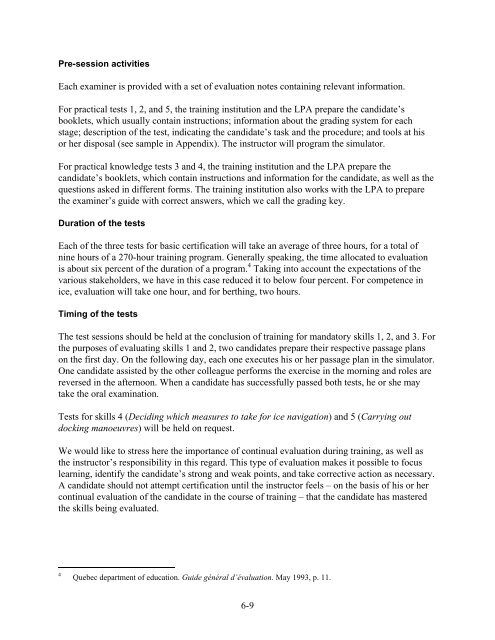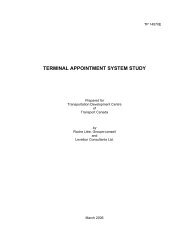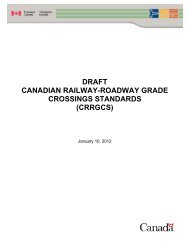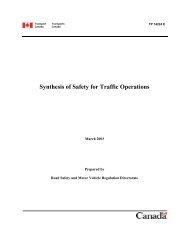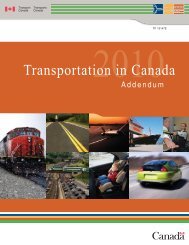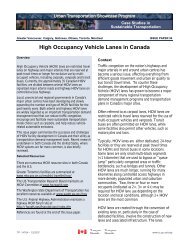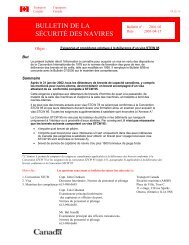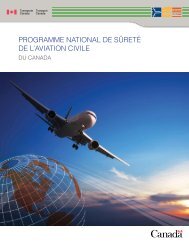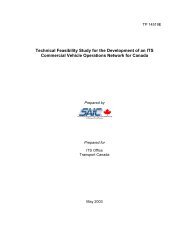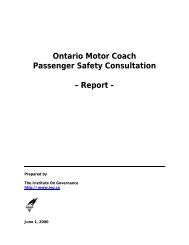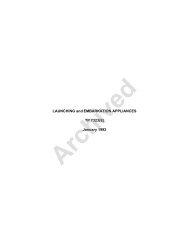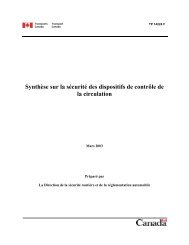District II Quebec City-Les Escoumins - Transports Canada
District II Quebec City-Les Escoumins - Transports Canada
District II Quebec City-Les Escoumins - Transports Canada
Create successful ePaper yourself
Turn your PDF publications into a flip-book with our unique Google optimized e-Paper software.
Pre-session activities<br />
Each examiner is provided with a set of evaluation notes containing relevant information.<br />
For practical tests 1, 2, and 5, the training institution and the LPA prepare the candidate’s<br />
booklets, which usually contain instructions; information about the grading system for each<br />
stage; description of the test, indicating the candidate’s task and the procedure; and tools at his<br />
or her disposal (see sample in Appendix). The instructor will program the simulator.<br />
For practical knowledge tests 3 and 4, the training institution and the LPA prepare the<br />
candidate’s booklets, which contain instructions and information for the candidate, as well as the<br />
questions asked in different forms. The training institution also works with the LPA to prepare<br />
the examiner’s guide with correct answers, which we call the grading key.<br />
Duration of the tests<br />
Each of the three tests for basic certification will take an average of three hours, for a total of<br />
nine hours of a 270-hour training program. Generally speaking, the time allocated to evaluation<br />
is about six percent of the duration of a program. 4 Taking into account the expectations of the<br />
various stakeholders, we have in this case reduced it to below four percent. For competence in<br />
ice, evaluation will take one hour, and for berthing, two hours.<br />
Timing of the tests<br />
The test sessions should be held at the conclusion of training for mandatory skills 1, 2, and 3. For<br />
the purposes of evaluating skills 1 and 2, two candidates prepare their respective passage plans<br />
on the first day. On the following day, each one executes his or her passage plan in the simulator.<br />
One candidate assisted by the other colleague performs the exercise in the morning and roles are<br />
reversed in the afternoon. When a candidate has successfully passed both tests, he or she may<br />
take the oral examination.<br />
Tests for skills 4 (Deciding which measures to take for ice navigation) and 5 (Carrying out<br />
docking manoeuvres) will be held on request.<br />
We would like to stress here the importance of continual evaluation during training, as well as<br />
the instructor’s responsibility in this regard. This type of evaluation makes it possible to focus<br />
learning, identify the candidate’s strong and weak points, and take corrective action as necessary.<br />
A candidate should not attempt certification until the instructor feels – on the basis of his or her<br />
continual evaluation of the candidate in the course of training – that the candidate has mastered<br />
the skills being evaluated.<br />
4<br />
<strong>Quebec</strong> department of education. Guide général d’évaluation. May 1993, p. 11.<br />
6-9


